General Apple and Mac desktop news is covered in Mac News Review. iPad, iPod, iPhone, and
Apple TV news is covered in iOS News
Review. All prices are in US dollars unless otherwise noted.
News & Opinion
Tech Trends
Products & Services
Software
News & Opinion
Apple's MacBook: The Laptop That Changed Almost
Everything
Cnet's Dan Ackerman notes that one of Apple's most influential
product designs is actually one of its most traditional, at least by
initial appearances, namely the MacBook laptop. First introduced in
2006, the 15"
MacBook Pro replaced the 15" aluminum PowerBook G4 and
was followed several months later by the polycarbonate MacBook,
available in white or black, neither of which looked (or worked)
radically different from their PowerBook and iBook predecessors. They
seemed unlikely paradigm-busters, but Apple persevered in the laptop
space, which was already on its way to eclipsing desktop machines as
the dominant PC category.
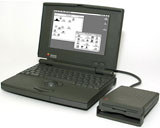
PowerBook 100 from 1991.
Publisher's note: Today's MacBook Air and MacBook Pro models
are direct descendants of Apple's first PowerBooks - the 100, 140, and 170 - introduced in October 1991. Although
the trackball gave way to a trackpad, the basic design has not only
remained the same but also influenced the design of practically every
new laptop since 1991. dk
Link: Steve Jobs and
the Apple MacBook: The Laptop That Changed (Almost) Everything
Apple's Smallest Laptop Leads to the Future of the
Mac
Macworld's Michael Gartenberg says the MacBook Air changed Apple's
philosophy on the notebook market, dumping the optical drive, using a
battery that users couldn't replace, and offering a solid-state drive
for the first time in an Apple laptop, and that especially this year's
models, with the latest and greatest Intel Core i5 processors, the
return of the backlit keyboard, and still at an entry-level price of
$999, combined with Lion and its trackpad gestures influenced by iOS,
and concepts such as fullscreen applications that (purportedly) make
the 11" MacBook Air
significantly more usable on a day-to-day basis, Apple is taking the
personal computer to a new level of evolution in many ways.
Gartenberg notes that like the iPad and iPhone, the new MacBook Air
is virtually an always-on device with a wake time that's virtually
instantaneous and the fastest reboot times in the industry, fewer than
ten seconds to go from cold boot to connected system, but unlike
cloud-client devices such as Google's Chromebook, the Air is still a
full-featured personal computer experience with a complete desktop
operating system and self-contained file system, and with processors
that capable of handling the majority of tasks most consumers will ever
require, with little or no compromise in performance.
He suggests, quite reasonably, that more of the MacBook Air feature
set will find its way into the rest of the MacBook line as design
evolution progresses.
Publisher's note: The Mid
2011 Mac mini has no optical drive and can be ordered with SSDs
instead of or in addition to a hard drive, making it more like the
MacBook Air than any other desktop Mac. dk
Link: Up in the
Air
Tech Trends
World's First Dual 17" HD Display Laptop
Launched
The SpaceBook dual 17" screen laptop will be shipping to customers
in November 2011, starting at $1,899 with free shipping and a 30-day
money back guarantee to the USA and Canada. The Designer, Gordon
gScreen Founder and CEO Alan Stewart, invented the SpaceBook because he
needed a mobile workstation for editing video, photography, and web
design while traveling on a 6-month Hawaii film project.
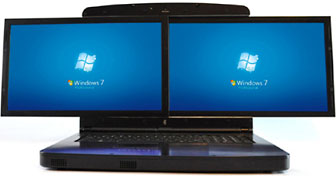 The SpaceBook is
unlike any other laptop in that rather than a single display, it has
two 17" full HD (1920 x 1080) glass panels, available in either a
glossy or matte finish, that slide out from the center to create a
panorama effect.
The SpaceBook is
unlike any other laptop in that rather than a single display, it has
two 17" full HD (1920 x 1080) glass panels, available in either a
glossy or matte finish, that slide out from the center to create a
panorama effect.
The SpaceBook can help users get up to 50% more work done when
compared to a single screen alternative according to a Microsoft
study and is essentially is mobile workstation and a desktop
replacement solution for business and personal use.
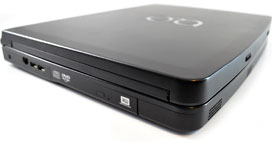 The
SpaceBook, at 10 pounds, weighs about three pounds more than the
average 17" laptop (7 pounds), but gives users that extra full size 17"
screen for mobile productivity. Specs include Windows 7 Pro, an Intel
Core i7 quad-core CPU with 8 GB DDR1333 RAM, a webcam, a 500G HDD,
Nvidia discrete graphics, HDMI, and Super DVD ODD.
The
SpaceBook, at 10 pounds, weighs about three pounds more than the
average 17" laptop (7 pounds), but gives users that extra full size 17"
screen for mobile productivity. Specs include Windows 7 Pro, an Intel
Core i7 quad-core CPU with 8 GB DDR1333 RAM, a webcam, a 500G HDD,
Nvidia discrete graphics, HDMI, and Super DVD ODD.
Customers can opt-into the free 'Trade-back' program so that they
can trade in their first generation SpaceBook for a 2nd generation when
released and receive a 50% credit towards their new SpaceBook with new
specs. Customers can also sign-up to become affiliates and offer the
SpaceBook to their friends for $100 off while earning themselves
$100.
Link: gScreen
SpaceBook
Products & Services
Sonnet Echo ExpressCard/34 Thunderbolt Adapter
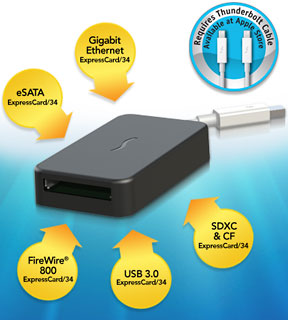 PR: Thunderbolt technology offers throughput
speed up to 10 Gb/s, and versatility - supporting high-resolution
displays plus high-performance data devices through a single, compact
port - that make it clear this is the next generation I/O technology,
available today.
PR: Thunderbolt technology offers throughput
speed up to 10 Gb/s, and versatility - supporting high-resolution
displays plus high-performance data devices through a single, compact
port - that make it clear this is the next generation I/O technology,
available today.
But what about connecting existing FireWire, eSATA, and USB 3.0
peripherals as well as high speed memory cards? Sonnet's Echo
ExpressCard/34 Thunderbolt Adapter expands Thunderbolt connectivity to
support more than just storage systems and monitors. This adapter adds
an ExpressCard/34 2.0 slot to any computer to which its connected,
enabling you to use a wide variety of ExpressCard/34 cards to add a
wide range of interfaces and capabilities to your system.
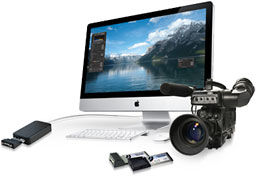 Examples include adding more FireWire ports, a
Gigabit Ethernet connection or an eSATA interface through a single
Thunderbolt adapter. This card adapter allows you to choose your
connections and add more to your setup. Because this adapter supports
hot-swapping, you can select and change the ExpressCard to use as
needed. It supports most Sonnet ExpressCard/34 cards (with a PCI
Express interface), such as FireWire, Gigabit Ethernet, and USB 3.0
interfaces, CompactFlash and SDXC card readers, and select eSATA
controllers. It also supports specialty adapters like the latest
revision PCIe Bus Extender for Sonnets Qio Professional Media Readers,
and the interface adapter for the AJA io Express.
Examples include adding more FireWire ports, a
Gigabit Ethernet connection or an eSATA interface through a single
Thunderbolt adapter. This card adapter allows you to choose your
connections and add more to your setup. Because this adapter supports
hot-swapping, you can select and change the ExpressCard to use as
needed. It supports most Sonnet ExpressCard/34 cards (with a PCI
Express interface), such as FireWire, Gigabit Ethernet, and USB 3.0
interfaces, CompactFlash and SDXC card readers, and select eSATA
controllers. It also supports specialty adapters like the latest
revision PCIe Bus Extender for Sonnets Qio Professional Media Readers,
and the interface adapter for the AJA io Express.
Set up for this Sonnet adapter is simple - just connect it directly
to your computer or at the end of a Thunderbolt device chain with a
Thunderbolt cable (not included, sold at the Apple Store) that's it.
There's no software to install and no power supply to plug in. Plug the
ExpressCard/34 card into the Echo ExpressCard/34 Thunderbolt Adapter as
you would into a notebook computer's ExpressCard slot, install software
for the adapter if necessary, and you're ready to work.
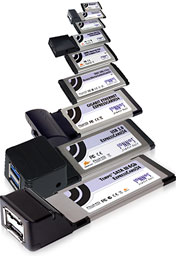 Key Features:
Key Features:
- Expands Your Computer's Connectivity and Capabilities: Enables you
to use ExpressCard/34 adapters with Thunderbolt technology-equipped
computers
- Fast Interface: High-performance 10 Gb/s Thunderbolt technology, 5
Gb/s ExpressCard/34 2.0 interface
- Supports Common ExpressCard/34 Adapters: Supports Sonnet
CompactFlash and SDXC readers; FireWire, Gigabit Ethernet, USB 3.0, and
select eSATA adapters
- Supports Specialty ExpressCard/34 Adapters: Supports ExpressCard
adapters for specialty devices such as Sonnet's Qio and the AJA io
Express
Versatile Connectivity via Thunderbolt
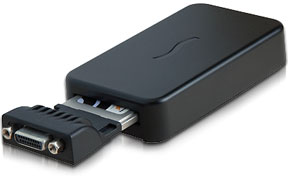 Sonnet's Echo ExpressCard/34 Thunderbolt Adapter
opens a world of connectivity options to any Thunderbolt
technology-enabled computer. ExpressCard/34 adapters, originally
intended for use with notebook computers, offer users additional
connectivity and functionality beyond what's available through their
computers stock configuration. With Sonnet's Echo ExpressCard/34
Thunderbolt Adapter, you can have a Gigabit Ethernet Thunderbolt
adapter, an eSATA Thunderbolt adapter, a FireWire 800 Thunderbolt
adapter, a USB 3.0 Thunderbolt adapter, or an SDXC or CF Thunderbolt
adapter. Your options are limitless.
Sonnet's Echo ExpressCard/34 Thunderbolt Adapter
opens a world of connectivity options to any Thunderbolt
technology-enabled computer. ExpressCard/34 adapters, originally
intended for use with notebook computers, offer users additional
connectivity and functionality beyond what's available through their
computers stock configuration. With Sonnet's Echo ExpressCard/34
Thunderbolt Adapter, you can have a Gigabit Ethernet Thunderbolt
adapter, an eSATA Thunderbolt adapter, a FireWire 800 Thunderbolt
adapter, a USB 3.0 Thunderbolt adapter, or an SDXC or CF Thunderbolt
adapter. Your options are limitless.
Compatible ExpressCard/34 Adapters
A list of adapters currently
compatible with the Echo ExpressCard/34 Thunderbolt Adapter can be
found on Sonnet's website.
This product is scheduled for release by the end of October and will
sell for $149.95.
Link: Sonnet Echo
ExpressCard/34 Thunderbolt Adapter
OWC Announces Its Lowest Priced 60 GB SSD, the
Mercury Electra 6G
PR: Other World Computing (OWC) has announced the $129.99
MSRP 60 GB capacity model to its award-winning, built in the USA OWC
Mercury Electra 6G Solid State Drive line. Offering a lower starting
price point to one of the industry's fastest 6G SSD lines, the new
SandForce Driven 6 GB/s 60 GB capacity OWC Mercury Electra 6G SSD
utilizes the highest quality components available, including Tier
1/Grade A NAND, to deliver 556 MB/s read and 523 MB/s write sustained
data rates for over 7X faster performance than a standard factory hard
drive found in Mac and PC computers.
Two Consumer/Prosumer Models in Seven Capacities Starting at
$129.99
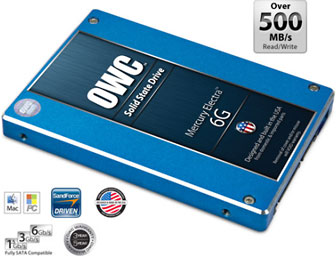 OWC Mercury 6G SSDs come in two
models (Mercury Electra 6G and Mercury Extreme Pro 6G) offering seven
capacities from 60 GB to 480 GB, priced starting at $129.99.
OWC Mercury 6G SSDs come in two
models (Mercury Electra 6G and Mercury Extreme Pro 6G) offering seven
capacities from 60 GB to 480 GB, priced starting at $129.99.
Mercury Electra 6G SSD: offers over 500 MB/s sustained data rate
performance of a 6G SSD for high speed personal computing, home office
environments, gaming, and production workstations, but is aggressively
priced like a 3G SSD. In addition to single drive use, it can be
incorporated into a RAID 1 or SPAN configuration and is available for
immediate ordering in 60 GB, 120 GB, 240 GB, and 480 GB capacities. For
more information on the new OWC Mercury Electra 6G 60 GB SSD, including
reseller inquiries, visit:
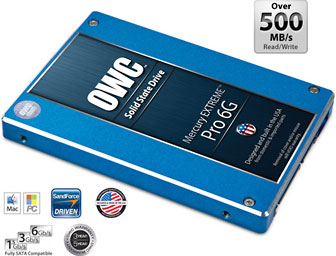 Mercury Extreme Pro 6G SSD:
offers prosumers and A/V, photography, and graphic production
professionals the ultimate in professional grade SSD performance with
over 500 MB/s sustained data rates and up to 479 MB/s incompressible
data rates. In addition to single drive use, it can be incorporated
into a RAID 0, 1, 10 or SPAN configuration, and is available for
immediate ordering in 120 GB, 240 GB, and 480 GB capacities.
Mercury Extreme Pro 6G SSD:
offers prosumers and A/V, photography, and graphic production
professionals the ultimate in professional grade SSD performance with
over 500 MB/s sustained data rates and up to 479 MB/s incompressible
data rates. In addition to single drive use, it can be incorporated
into a RAID 0, 1, 10 or SPAN configuration, and is available for
immediate ordering in 120 GB, 240 GB, and 480 GB capacities.
"Our newest 60 GB Mercury Electra 6G SSD is priced aggressively to
offer one of lowest price points on the market for one of the highest
performance SSD available," says Larry O'Connor, Founder and CEO, Other
World Computing. "Then factor in our best in class warranty coverage
and support services reputation and its safe to say this new model
represents the best value on the market for a 6G based SSD."
Maximizes Any Computers 1.5G, 3G, or 6 GB/s Data Bus
Whether a consumer has a Mac or PC with the SATA Revision 2.0 (3
Gb/s) data bus or the latest SATA Revision 3.0 (6 GB/s) interface,
the OWC Mercury 6G SSD line is able to deliver near bus saturating
speed when installed in either interface. OWC benchmark testing
confirms OWC Mercury 6G SSDs delivers sustained data rates over 275
MB/s in the 3G's 300 MB/s max speed bus. Taking advantage of 6G's
interfaces maximum bandwidth of 600 MB/s, Mercury 6G SSDs provide up to
559 MB/s sustained reads and 527 MB/s writes.
Doesn't Slow Down with Use Like Ordinary SSDs
Ordinary SSDs offer fast read/write performance during first initial
uses, but can then experience significant write speed degradation over
repeated, long-term usage. Independent simulation tests by leading
drive performance experts confirm OWC Mercury SSDs ultra-efficient
block management, wear leveling technologies, and real-time data
redundancies enable incredibly high performance and extreme
reliability, both of which are maintained over long-term intensive
use.
Up to 100x Greater Data Protection
Thanks to SandForce DuraClass technology, OWC Mercury 6G SSDs are
able to provide up to 100x higher data protection than provided by
ordinary SSDs as well as leading enterprise class hard disk drives. By
combining the highest level of Error Correction Code (ECC) and
SandForce RAISE (Redundant Array of Independent Silicon Elements)
technology along with 7% over provisioning reserve/overhead flash
allocation, OWC Mercury 6G SSDs provide RAID like data protection and
reliability in a single drive application.
Risk-Free 30-Day Satisfaction Guarantee
To ensure the highest level of customer satisfaction and confidence,
OWC is extending its 30-Day Money Back Guarantee to include the new
Mercury Electra 6G 60 GB model. If a consumer is not completely
satisfied with any OWC Mercury 6G SSD for any reason, they simply need
to contact OWC's award-winning Customer Service department which offers
24/7 Live Chat support - to request a full, hassle-free refund.
Link: Mercury
Electra 6G
SSD HDD Adapter Kit for Unibody MacBook Pros
PR: UK-based hardwrk.com offers an adapter kit for
installation of a second hard drive or SSD into the DVD drive bay of a
unibody-MacBook Pro. If you already own a MacBook Pro, with this
adapter kit you can combine the capacity of your existing hard drive
with the speed of an SSD for a fraction of the price a single
large-capacity SSD would cost you. That way you can store your OS on a
small SSD (e.g.: an 80 GB Intel X25-M) and keep all your user files on
the hard drive, such as a 500 GB drive. The SSD upgrade kit costs
£79 + shipping, and a small SSD (i.e., a 64 GB SSD by Samsung)
about £120.
Since you will still want to use your DVD-drive, also included is an
external USB enclosure for it, so you can keep on using the drive
seamlessly via a USB port of your MacBook Pro. The only thing that
isn't included is the hard drive or solid state drive itself.
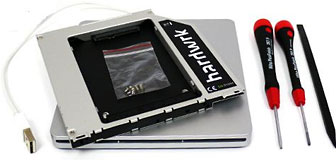 The kit includes:
The kit includes:
- 1x hardwrk SSD HDD Adapter
- 2x Wiha precision mechanics screwdriver
- 1x external USB-DVD-Drive enclosure
- 1x electrical engineering spudger
- 1x printed installation instruction
A step by step manual including comprehensive text, detailed photos
and tips and tricks will help you get the installation done in 60
minutes max. Hardwrk's YouTube video shows
how it's done.
All tools needed are included with the kit, from a precision
mechanic's screwdriver to as electrical engineering spudger for
disconnecting the plugs on the logic board.
£79 plus shipping
Link: SSD
HDD Adapter Kit For MacBook (Pro)
Software
BatterySqueezer 1.5 Helps Get Longer Battery Life
on Your MacBook
PR: Applications, especially Internet browsers, can put a
heavy load on your system by demanding processing power even if they
are running in the background. BatterySqueezer throttles Flash
animations, videos, advertisements and virtually everything that run by
your browser when it is in the background.
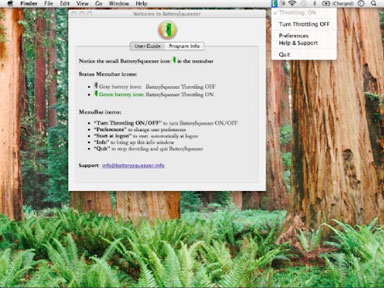 Active
programs running unnecessarily in the background can have many
consequences:
Active
programs running unnecessarily in the background can have many
consequences:
- High CPU demand
- More power requirement
- Shorter battery life
- Less available resources for your active applications
- Loud fan noise
If you visit webpages which have flash animations, videos or
JavaScripts running or you have many open tabs in your browser, it can
take more than 10%, often 20-30% and sometimes even 100% of your CPU
power.
Less CPU load = Lower energy consumption
Lower energy consumption => Batter battery life + Speed
Until now you have had basically one option: Close down the program.
Now there's BatterySqueezer, is a low footprint application that runs
discreetly on the menu bar and its icon can be hidden.
New in version 1.5:
- Fixed a bug which caused BatterySqueezer to occasionally crash
System requirements:
- Intel
- Mac OS X 10.6.6 or later
- 64-bit processor
$2.99 from the Mac App Store
Link:
BatterySqueezer
Bargain 'Books
For deals on current and discontinued 'Books, see our 13" MacBook and MacBook Pro,
MacBook Air, 13" MacBook Pro, 15" MacBook Pro, 17" MacBook Pro, 12" PowerBook G4, 15" PowerBook G4, 17" PowerBook G4, titanium PowerBook G4,
iBook G4, PowerBook G3, and iBook G3 deals.
We also track iPad,
iPhone, iPod touch, iPod classic, iPod nano, and iPod shuffle deals.


 The SpaceBook is
unlike any other laptop in that rather than a single display, it has
two 17" full HD (1920 x 1080) glass panels, available in either a
glossy or matte finish, that slide out from the center to create a
panorama effect.
The SpaceBook is
unlike any other laptop in that rather than a single display, it has
two 17" full HD (1920 x 1080) glass panels, available in either a
glossy or matte finish, that slide out from the center to create a
panorama effect. The
SpaceBook, at 10 pounds, weighs about three pounds more than the
average 17" laptop (7 pounds), but gives users that extra full size 17"
screen for mobile productivity. Specs include Windows 7 Pro, an Intel
Core i7 quad-core CPU with 8 GB DDR1333 RAM, a webcam, a 500G HDD,
Nvidia discrete graphics, HDMI, and Super DVD ODD.
The
SpaceBook, at 10 pounds, weighs about three pounds more than the
average 17" laptop (7 pounds), but gives users that extra full size 17"
screen for mobile productivity. Specs include Windows 7 Pro, an Intel
Core i7 quad-core CPU with 8 GB DDR1333 RAM, a webcam, a 500G HDD,
Nvidia discrete graphics, HDMI, and Super DVD ODD. PR: Thunderbolt technology offers throughput
speed up to 10 Gb/s, and versatility - supporting high-resolution
displays plus high-performance data devices through a single, compact
port - that make it clear this is the next generation I/O technology,
available today.
PR: Thunderbolt technology offers throughput
speed up to 10 Gb/s, and versatility - supporting high-resolution
displays plus high-performance data devices through a single, compact
port - that make it clear this is the next generation I/O technology,
available today. Examples include adding more FireWire ports, a
Gigabit Ethernet connection or an eSATA interface through a single
Thunderbolt adapter. This card adapter allows you to choose your
connections and add more to your setup. Because this adapter supports
hot-swapping, you can select and change the ExpressCard to use as
needed. It supports most Sonnet ExpressCard/34 cards (with a PCI
Express interface), such as FireWire, Gigabit Ethernet, and USB 3.0
interfaces, CompactFlash and SDXC card readers, and select eSATA
controllers. It also supports specialty adapters like the latest
revision PCIe Bus Extender for Sonnets Qio Professional Media Readers,
and the interface adapter for the AJA io Express.
Examples include adding more FireWire ports, a
Gigabit Ethernet connection or an eSATA interface through a single
Thunderbolt adapter. This card adapter allows you to choose your
connections and add more to your setup. Because this adapter supports
hot-swapping, you can select and change the ExpressCard to use as
needed. It supports most Sonnet ExpressCard/34 cards (with a PCI
Express interface), such as FireWire, Gigabit Ethernet, and USB 3.0
interfaces, CompactFlash and SDXC card readers, and select eSATA
controllers. It also supports specialty adapters like the latest
revision PCIe Bus Extender for Sonnets Qio Professional Media Readers,
and the interface adapter for the AJA io Express. Key Features:
Key Features: Sonnet's Echo ExpressCard/34 Thunderbolt Adapter
opens a world of connectivity options to any Thunderbolt
technology-enabled computer. ExpressCard/34 adapters, originally
intended for use with notebook computers, offer users additional
connectivity and functionality beyond what's available through their
computers stock configuration. With Sonnet's Echo ExpressCard/34
Thunderbolt Adapter, you can have a Gigabit Ethernet Thunderbolt
adapter, an eSATA Thunderbolt adapter, a FireWire 800 Thunderbolt
adapter, a USB 3.0 Thunderbolt adapter, or an SDXC or CF Thunderbolt
adapter. Your options are limitless.
Sonnet's Echo ExpressCard/34 Thunderbolt Adapter
opens a world of connectivity options to any Thunderbolt
technology-enabled computer. ExpressCard/34 adapters, originally
intended for use with notebook computers, offer users additional
connectivity and functionality beyond what's available through their
computers stock configuration. With Sonnet's Echo ExpressCard/34
Thunderbolt Adapter, you can have a Gigabit Ethernet Thunderbolt
adapter, an eSATA Thunderbolt adapter, a FireWire 800 Thunderbolt
adapter, a USB 3.0 Thunderbolt adapter, or an SDXC or CF Thunderbolt
adapter. Your options are limitless. OWC Mercury 6G SSDs come in two
models (Mercury Electra 6G and Mercury Extreme Pro 6G) offering seven
capacities from 60 GB to 480 GB, priced starting at $129.99.
OWC Mercury 6G SSDs come in two
models (Mercury Electra 6G and Mercury Extreme Pro 6G) offering seven
capacities from 60 GB to 480 GB, priced starting at $129.99. Mercury Extreme Pro 6G SSD:
offers prosumers and A/V, photography, and graphic production
professionals the ultimate in professional grade SSD performance with
over 500 MB/s sustained data rates and up to 479 MB/s incompressible
data rates. In addition to single drive use, it can be incorporated
into a RAID 0, 1, 10 or SPAN configuration, and is available for
immediate ordering in 120 GB, 240 GB, and 480 GB capacities.
Mercury Extreme Pro 6G SSD:
offers prosumers and A/V, photography, and graphic production
professionals the ultimate in professional grade SSD performance with
over 500 MB/s sustained data rates and up to 479 MB/s incompressible
data rates. In addition to single drive use, it can be incorporated
into a RAID 0, 1, 10 or SPAN configuration, and is available for
immediate ordering in 120 GB, 240 GB, and 480 GB capacities. The kit includes:
The kit includes: Active
programs running unnecessarily in the background can have many
consequences:
Active
programs running unnecessarily in the background can have many
consequences:
